
There’s gold, and it’s haunting and haunting;
It’s luring me on as of old;
Yet it isn’t the gold that I’m wanting
So much as just finding the gold.
It’s the great, big, broad land ’way up yonder,
It’s the forests where silence has lease;
It’s the beauty that thrills me with wonder,
It’s the stillness that fills me with peace.
~ “The Spell of the Yukon” Robert W. Service, 1907
Standing at a trailhead outside of Idaho City, snowshoes on top of five feet of snow, the Riverstone Grade 11 students listened to me read Robert W. Service’s “The Spell of the Yukon.” We were about to embark on an outdoor journey that would thematically connect with his poem better than we ever could have imagined. 48 hours after we stood at that trailhead, now that we are all home safe, Service’s lines ring true: “Yet it isn’t the gold that I’m wanting // So much as just finding the gold.” We snowshoed for miles into the wilderness of central Idaho, braved the snow and low temperatures, cooked in the chilling wind, and on day two came to understand just how wintry March can be in the mountains.
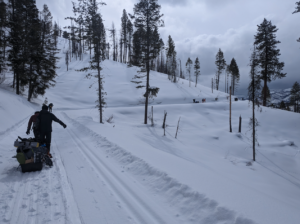
My “gold” (or goal) was to try and bake bread in the wilderness. Having visited Gaston’s Bakery on a previous Wednesday with the RiverstoneGrade 10 students, I envisioned eating a delicious, hearty, and freshly baked loaf on our winter trip to the mountains. I had planned for the students to take a dutch oven, some saws, a hatchet, and four pre-frozen loaves from Gaston’s into the wilderness as part of our winter snow school curriculum. We stuck the carefully wrapped and still frozen loaves a few layers into our jackets and hiked to a hilltop in the mountains. The journey to our destination was going to thaw the loaves and let them rise from our body heat. Laboring contentedly, we broke a new trail, built a small snow kitchen, downed some dead trees, and started a fire. Once we had created enough coals to heat up the dutch oven, I brought out a few copies of Jack London’s “To Build a Fire” to read as we waited. As it would turn out, nature had a lesson planned in addition to the one I had prepared.
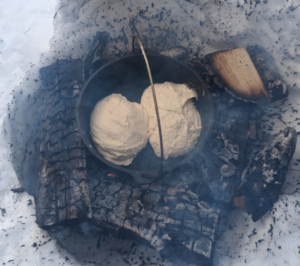
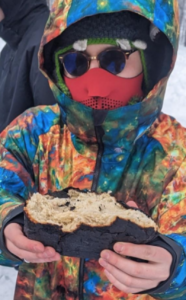
The bread baked in our oven as I read the story of a man’s attempt to survive the bitter cold. All ofus huddled around the midday fire excited by the snack to come. In true Riverstone and I.B. fashion, we learned from our failures as the first batch burnt under the extra wood I surely thought was necessary. While the outside was thoroughly blackened, the soft and delicious interior wasprecisely the motivation we needed to get the second batch just right. So we loaded the next two loaves into the oven and I continued the short story; as the protagonist slowly froze, the bread baked wonderfully and the wind picked up. By the end of the story, two members of our party had built an impromptu snow shelter, students were actively stopping their feet to warm up and others were packing up. We had all had enough of the cold, but the second batch of bread we baked was warm and comforting and some of the most delicious I’d ever tasted.
Deciding to eat a real lunch back in the yurts, we hurriedly hiked the way we had come up. Through a stroke of providence, Derek Wright, our trip leader, noticed a sign saying “Cell Phone Service Area” and checked his messages: Highway 21 was going to close to an impending storm that evening and we needed to evacuate. Skipping a proper lunch, still chilled from our days’adventure, we packed up camp in a record 45 minutes and rushed back to the trailhead. The group nary complained and was able to persevere through yet another series of challenges.
An early evacuation is never enjoyable, but neither is being stranded in a yurt two more days than expected– and no more bread to cook this time. That said, the lessons we learned as teachers, students, outdoor enthusiasts, and Idahoans will stick with us. While Robert W. Service wrote his poem about The Yukon, this week it applied to my experience in Idaho.
No! There’s the land. (Have you seen it?)
It’s the cussedest land that I know,
From the big, dizzy mountains that screen it
To the deep, deathlike valleys below.
Some say God was tired when He made it;
Some say it’s a fine land to shun;
Maybe; but there’s some as would trade it
For no land on earth—and I’m one.
Sincerely,
Brett Lofgren, MYP English Teacher

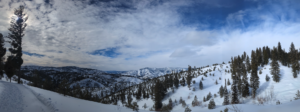
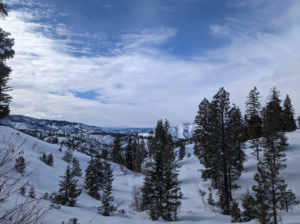
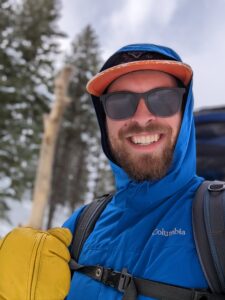

.png&command_2=resize&height_2=85)

















